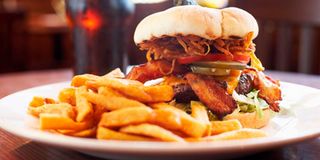
Researchers say that over the past 30 years, there has been a significant increase in children’s intake of ultra-processed food.
| FotosearchNews
Premium
Study: Why junk foods are bad for children’s bones
What you need to know:
- According to FAO, ultra-processed foods undergo extra processing that include additives that could duplicate or boost the sensory qualities of foods.
- This in turn makes them ‘ready-to-eat’ and are mostly the go-to foods for most people despite them lacking the required nutritional benefits.
Your child’s favourite junk food could make them have weak bones and general growth delay.
Researchers from the Hebrew University of Jerusalem have published their findings in Nature’s journal Bone Research that explain the link between ultra-processed food and bone health especially on a child’s formative stage of development.
The researchers say that over the past 30 years, there has been a significant increase in children’s intake of ultra-processed food which has now been found to affect their bone health.
The NOVA system of food classification has four categories and ultra-processed foods rank fourth – suggesting different industrial processes.

An unhealthy diet of junk food. Pool
According to the Food and Agriculture Organisation, ultra-processed foods undergo extra processing that include additives that could duplicate or boost the sensory qualities of foods.
This in turn makes them ‘ready-to-eat’ and are mostly the go-to foods for most people despite them lacking the required nutritional benefits. Such foods include soft drinks, snacks, sweets, cakes, cheese, pasta, pizza, pre-prepared meat, among others.
“This reflects children’s excessive consumption of food and drink that are high in fat and refined sugars but do not provide appropriate levels of the proteins, vitamins and minerals required for growth,” the study says.
Eunice Nthenya, a Kenyan based nutritionist says that daily consumption of junk is detrimental to a child’s health including their bone development.
Ultra-processed diet
“Ultra-processed foods rarely have the required nutrients that can boost one’s bone health,” she says
“For a child’s bones to be strong, they require key nutrients such as calcium and Vitamin D, no wonder children are advised to take food rich in those nutrients or simply bask in the sun for Vitamin D. But ultra-processed food have minimal nutritional benefits to the bone since they mostly contain carbohydrates,” she explains.
To explain the phenomenon, the researchers conducted their research using rodents in their pre-clinical trial.
The six-week long trial spanned between weaning age to puberty representing growth plates (areas of new growth of bones mostly found near the end of long bones) closure in humans.
The result of the trials at six weeks showed that ultra-processed diet showed a reduction in bone volume fraction (volume of mineralised bone per unit volume of the sample) by half in the longest and thickest bone of a human being located in the thigh and upper hind limb- the femur. Bone mechanical parameters such as stiffness decreased in a great way.
“Analyses of these bones (the one’s used in the study) revealed a disordered growth plate characterised by a non-calcified (not hardened), non-vascularised (without the required blood vessels) cartilage lesion. This rare and severe phenotype (observable physical characteristics) differs greatly from other abnormal growth plate phenotypes, such as rickets and protein-energy malnutrition,” the researchers explained
The researchers also looked into the eating patterns where they gave 30 per cent of balanced diet to the rats and 70 per cent of junk in a week.
“Despite the lower consumption of calories, in the 30 per cent /70 per cent group, the growth patterns were similar to those in the control group,” they found out.
Soft drinks
A conclusion was made that even the slightest consumption of ultra-processed food makes the bone muscles weak.
The soft drinks used in the study were found to have high levels of phosphoric acid and were found to reduce accumulation of bone minerals.
Dr Wasena Angira, an Orthopaedic Surgeon and Pain Specialist, says there is a correlation between obesity and weak bones.

“Obesity which is mostly caused by continuous consumption of junk food is not good for a child’s bone health, it could reduce their bone density,” he says.
He links this to insufficient calcium deposit to the bones.
“Obese people tend to have too much fat that make the intestines to compete with unsaturated fats, therefore, calcium absorption into the bones will be hard. When they get an accident and fall, they are likely to have fractured bones compared to non-obese people,” he adds.
Healthy eating
To examine why the bone’s outside appearance was not normal and why there was bone retardation, the researchers studied the components of the foods they used in the study.
“We demonstrated neither the soft drink nor the macronutrients was the cause, but the calcium and phosphoric deficiency and imbalance caused damage that was similar to but less severe than that caused by the ultra-processed diet,” they explained.
That explains the need to embrace healthy eating and shun ultra-processed foods.
“Over processing is not always classified as a damaging process since well-balanced healthy products such as infant formulas are also included in this food group. However, the combination of sugar and oil overload with micronutrient deficiency and harmful processing procedures (such as partial hydrogenation of oils) may be the driving force behind impaired bone development,” they explained.
Dr Joseph Mutuku, a radiologist, says that there is a need for a trial in humans to verify the findings from the preclinical trial done in rodents.
“You need a bone specialist in possession of the real data of people (with age target mostly) who have undergone bone densitometry (a radiological procedure for checking bone density),” he said.
“The challenge would be pinning them to their residence (urban or rural) and again establishing their diet,” he adds.





